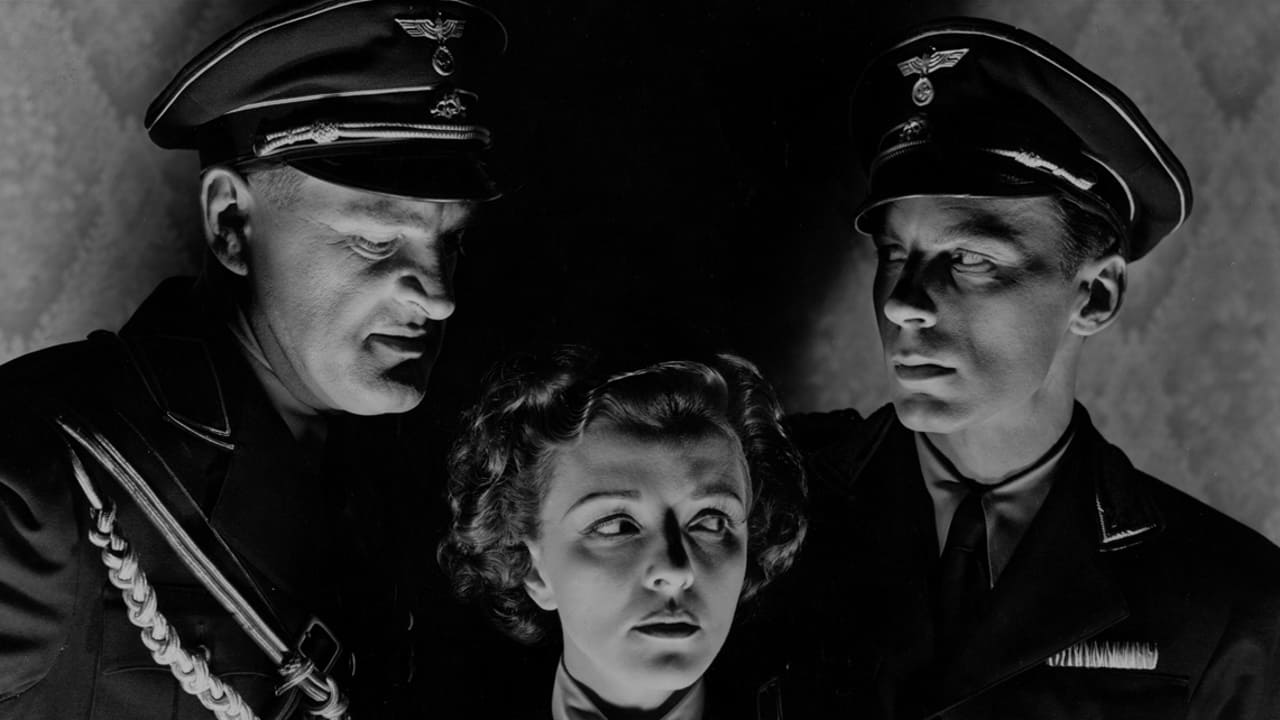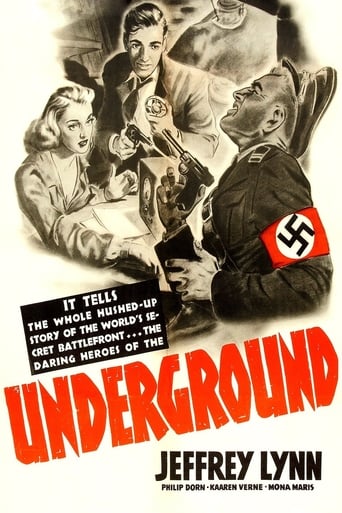

Waste of time
... View MoreLet's be realistic.
... View MoreExcellent, Without a doubt!!
... View MoreBest movie ever!
... View MoreUNDERGROUND 1941This 1941 Warner Brothers production is one of the earlier films to deal with the anti-Nazi German Resistance movement. The film stars, Philip Dorn, Jeffery Lynn, Mona Maris, Kareen Verne, Peter Whitney and Martin Kosleck. This one has the old story chestnut of two brothers on opposite sides. Philip Dorn is a chemical engineer with a dangerous second job, that of a radio broadcaster for the secret German underground. He tells the German public the truth about what the Nazis are up to. Of course the Gestapo types are out to collar said underground members. The underground has to constantly be on the move after each broadcast. This is to prevent the authorities from locating the transmitter.Dorn's younger brother, Jeffery Lynn, now puts in an appearance. Lynn has just been discharged from the army after losing an arm in combat. Lynn is of course a die-hard Nazi. In the mix here is Kareen Verne, a member of the underground that Lynn takes a liking to. Dorn and Verne hide the fact that they both are part of the resistance from Lynn.The head Gestapo man is played by Martin Kosleck. Kosleck made a career out of playing various Nazi weasel types. Kosleck's secretary is played by Mona Maris. Kosleck and his bunch nearly grab up Dorn, Peter Whitney and the rest during a broadcast. They are warned by Miss Maris just in time about the raid. Maris is an underground agent who is their contact on the Gestapo staff. Kosleck tries a new ploy and releases a former resistance member, Wolfgang Zilzer. Zilzer has been beaten, tortured, and turned, he is now willing to help the Gestapo. Hoffman leads Kosleck and a Gestapo squad to a meeting place at a Berlin café. Shots are exchanged and an underground type is killed. Miss Verne, who is employed at the café as a violin player, is grabbed up in the raid. Also grabbed up is Jeffery Lynn. He tells the Gestapo that he is seeing Miss Verne and that she cannot possibly with the underground. (Which he believes) Kosleck lets her go, but only if Lynn agrees to keep tabs on her. Lynn agrees to the arrangement. The ever true blue Nazi, Lynn, is dumbstruck when he now discovers that Miss Verne is with the resistance. He does not know whether to turn her in or what. He decides to convince her to quit the underground. He gives the Gestapo info he overhears about a new broadcast location. Needless to say, he does not know that he has actually turned in his brother, Dorn. Dorn is carted off for a round of shall we say, not so gentle questioning. The brother's father, Erwin Kaiser, is also taken into custody. Both are sentenced to the chopping block. Lynn is horrified at what he has done, but tells Kosleck that it was the job of every good German to turn in traitors. He knows that he cannot save his brother and father. The Gestapo of course now trust him. They announce on the radio that the underground broadcasts have been quashed, and the traitors killed. This last statement turns out to be less than accurate as the broadcasts begin again. This time it is Lynn at the microphone.This one plays out more or less like the same years British film, FREEDOM RADIO, both of which follow the same idea. Warner Brothers must have sent out a casting call for every German actor in Hollywood. There is at least a couple dozen German born actors in various roles. Look close and you will see Hans Conried and Henry Brandon in small bits. The director here is Vincent Sherman. Sherman is best known for a string of excellent film noir such as, NORA PRENTISS, THE UNFAITHFUL, BACKFIRE, THE GARMENT JUNGLE, FLIGHT FROM DESTINY and THE DAMNED DON'T CRY. Cinematographer Sid Hickox gives the film a nice assortment of grey and black hues. Three time Oscar winning composer, Adolph Deutsch, supplies the top flight score. Martin Kosleck and Mona Maris would play pretty well the same characters in 1942's BERLIN CORRESPONDENT, with Dana Andrews.
... View MoreNazi soldier Jeffrey Lynn (Kurt) returns home on the night that his brother Philip Dorn (Eric) is due to make an illegal Resistance radio broadcast. The brothers are at odds in their beliefs but Lynn is unaware of how his brother feels and his role with the Resistance. One of Dorn's allies is Kaaren Verne (Sylvia) who plays violin at a club. She becomes the focus of Lynn's romantic interests but he remains unaware of her involvement in the Resistance. Will the Nazi brother suss out what is going on? And will he inform on his brother and the woman he loves to Gestapo chief Martin Kosleck (Heller)? This film is better than expected and there are several tense scenes, eg, when Verne is sent to collect some radio equipment and must change her routine in the last seconds as Gestapo officers wait to arrest her. There is also a good scene between Gestapo secretary Mona Maris (Gessner) and Lynn as she points out a few home truths to him. I liked Philip Dorn and felt that it was his film and he should have been given the headline credit. He has a powerful scene when he goes to confront his Nazi brother about what course of action with regards the reporting of Verne that he will take. Dorn cannot afford the wrong decision to be taken and is prepared for what he may have to do. Another good scene involves Dorn and fellow Underground member Peter Whitney (Alex) as they confront Resistance traitor Wolfgang Zilzer (Hoffman). The only poor acting comes from a couple of Resistance figures as they try to leave a club un-noticed. They stand out a mile in terms of suspicious behaviour. I'm afraid they get what they deserve for being so crap. Otherwise, the acting is very good all round. It's a pity that they bring some complicated poem into the proceedings - no way would anyone remember that clunky thing.Overall, a good film. The Gestapo team reminded me of the French Resistance UK comedy of the 1980s "Allo Allo". Kosleck and Maris have that similar fetishized imagery working for them as was exploited by Gestapo officer "Herr Otto Flick" and his secretary "Helga". There is definitely some kind of repressed kinkiness going on. The scene with the boots and the whip and Kaaren Verne draped over a seat. Definitely. The only detail missing is revealing that Kosleck is wearing ladies lingerie throughout the whole film.
... View MoreIn 1941, rising Warner Brothers director Vincent Sherman took two different looks at the World War II underground. The Damon Runyeon like "All Through the Night" took the mugs of New York City and had them exposing Fifth Columnists utilizing an upscale auction shop as their base of operations, and "Underworld" revealed that even the families of World War I who were still haunted by losing that war didn't want to be involved in Hitler's war simply because they knew the motivations for it were wrong. In fact, an entire family finds themselves being torn apart by the political differences between two brothers (Jeffrey Lynn and Philip Dorn), the youngest a devoted Nazi soldier and the other secretly working in the underground.While the outstanding "All Through the Night" focused on comic undertones with a serious main plot, "Underground" is strictly dramatic, and powerfully so. It was released before the United States got involved in World War II, while "All Through the Night" got released almost immediately afterwords. That film had the ironic coincidence of an attempted attack on the New York Harbor, coming just as Pearl Harbor was attacked. Certainly heavy on propaganda, it served the purpose of letting Americans know that just because the enemy was near didn't mean that every citizen of that enemy nation was on the side of evil. The righteous include Lynn and Dorn's parents, a neighbor (Ludwig Stossel, a victim of Nazi villainy in "All Through the Night") who lost his son in battle, a café violin player (Kaaren Verne, "ATTN's" heroine) and even the severe looking assistant (Mona Maris) to nasty Nazi Martin Koslock, also called back by Sherman to play the head speaker at the Nazi meeting in the conclusion of "ATTN". It should be noted that Maris looked pretty much exactly the same in 20th Century Fox's banal "Berlin Correspondent", although in that film, there was no doubt where her loyalties lay.This is one of those war films which grabs you from the beginning and never lets you go. While it is clear that the underground for the most part will come out on top, there are some gripping moments where your doubts take over, such as a chase sequence where Kosleck and his men head to the location where Dorn's radio truck is in the process of delivering an underground message. There's also a hand-ringing confrontation between Dorn and another member of the underground with a recently released concentration prisoner, basically brainwashed by years of torture into doing the Nazi's bidding. When he tries to plead for his life, it almost appears that the good guys are the actual bad guys, but a twist in their decision of how to handle him gives way to a powerful moment of retribution and atonement. The ending is straight out of "A Tale of Two Cities", but is moving rather than corny, even though I found myself quoting Ronald Colman's delivery of Dicken's immortal words in the film's final moments. Verne, whose "All Through the Night" character became involved with the Nazi's merely to save her imprisoned father, is clearly on the side of the underground, and when she is exposed for being the recipient of newly purchased radio equipment, she undergoes a torture so brutal that it is difficult at times to watch, especially when Kosleck forces her to sign a statement indicating that she was treated fairly. Presented with much subtlety, "Underground" is an important film in the sense that almost 75 years later reminds its new audiences to not judge the entire population of a nation by its leaders or military, in other words, to minimize the hate and remember that people of free minds will always stand up to their government, even if their lives are threatened.
... View More"Underground" is a good propaganda movie that came out of Warner Brothers in 1941. It's lacking major stars, but the story is certainly A list. Philip Dorn and Jeffrey Lynn star as German brothers on opposite sides. Dorn is a member of the underground, which uses a traveling illegal radio to broadcast to the people, while Lynn is a returning soldier who has lost his arm. He becomes interested in an attractive violinist, Sylvia (Kaaren Verne) who performs in a tavern, unaware that his brother knows her from the underground and that they are both members. This leads to problems as the Nazis close in.Vincent Sherman does an excellent job of directing. The rest of the cast includes Martin Kosleck a a nasty Nazi, and Mona Maris as his assistant, also an underground member. The Dutch Dorn gives a very good performance, as does Lynn. The ending of the film is quite touching.As someone on this site pointed out, the Germans let the Nazis come into power and didn't do much in the way of resistance. There was a strong French resistance, as well as the Yugoslav Partisans, the Polish Home Army, the Soviet partisans, the Italian CLN, the Norwegian Resistance, the Greek Resistance and the Dutch Resistance. One doesn't hear much about German resistance. Warner Brothers probably just assumed it was active.A good movie.
... View More